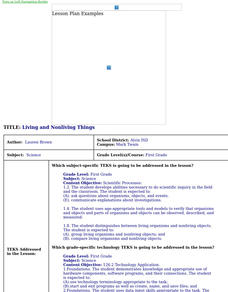Curated OER
Science - What do living things need?
In this living things worksheet, students answer questions that ask what living things need. Students answer 10 questions in the true and false and short answer format.
Casimir Middle School
Biological Classification Worksheet
Classify living things with a set of worksheets that has pupils sorting and indentifying living and non-living things. Learners use the worksheets as a basis for finding their answers.
Curated OER
Living and Non-Living Things | What’s Alive?
Students compare and contrast living and nonliving things. In this classification lesson plan, students read a book featuring living and nonliving things and then sort pictures of living and nonliving things.
Curated OER
Being Alive
Young biologists use a activity to fill in the blanks of five sentences. Each one needs a word from a word band at the top of the resource. All of the sentences are about things that are alive, and how we know they are alive. The words...
Curated OER
Characteristics of Living Things
Student use the scientific method to experiment with worms. In this characteristics of living things lesson, students predict and examine the reactions of worms to dry and wet soil. Students share their findings.
Curated OER
Renewable vs. Non-Renewable Resources
Fifth graders are introduced to the important topic of renewable, and non-renewable, resources. They are expected to be able to correctly categorize different types of resources as renewable or non-renewable. Another emphasis of this...
Curated OER
Life Science Observations: Living vs. Non Living Things
Students investigate the difference between living and non-living things. In this life science lesson plan, students discover the different characteristics of living things and the natural or human created non-living things. Students...
Curated OER
Living vs. Non-Living Things
Fourth graders describe the characteristics that determine if something is living, dead, or non-living. They determine the difference between living and non-living things. Students determine if an object is living or non-living and...
National Park Service
Living & Non-Living Interactions
What better way to learn about ecosystems than by getting outside and observing them first hand? Accompanying a field trip to a local park or outdoor space, this series of collaborative activities engages children in learning about the...
Curated OER
Living vs. Non-living
Students go on a nature walk and observe and discuss the living and non living things they see in the ecosystem. In this living and non living lesson plan, students complete a connecting string activity to simulate an ecosystem.
Curated OER
Classifying Living and Non-Living Objects
Students investigate living organisms and define the properties of a living species. In this life characteristic lesson plan, students examine plants in their class and discuss whether or not they are alive. Students create a living...
Curated OER
What is a Living Thing, and How Does a Living Thing Respond to Its Environment?
Students investigate how living things interact with their environment. In this living things lesson, students complete lessons for science investigations on what living things have in common. Students study cells, complete...
Curated OER
Living and Nonliving Things
First graders distinguish between living and nonliving objects, and compare living organisms and nonliving objects.
Curated OER
Living it up with plants
Have kids in grades K-2 discuss how they know a tree is alive. The worksheet provides simplistic background information and an observation check list. They check off the ways that they can tell an oak tree is a living thing. Note: The...
Curated OER
Draw an Alien in Natural Habitat
Students apply prior knowledge of living things, structures of living things and how living things sense and respond to their environment. In this habitat lesson, students review the basic needs of organisms to survive. Students create...
Curated OER
It's Alive! Or is it...?
Students apply their knowledge of the characteristics of living things to unknown creatures to determine whether they can be considered "alive." They watch a Star Trek episode, then describe the characteristics of life.
Curated OER
The Martian and the Car
In this living things activity, students determine 5 things about a car that makes it seem like its a living thing and 5 things that prove it is not a living thing. This activity has 10 short answer questions.
Curriculum Corner
Living/Non-Living Objects
Which of these pictures is living? Which one is non-living? Use a set of pictures to introduce living and non-living objects to young scientists.
Curated OER
Living / Non-living
First graders shoot photographs of living and non-living things. In this living and non-living organism lesson, 1st graders discuss the attributes of living things, take digital photographs of living and non-living things, and design a...
Curated OER
Plants are Growing and Changing
Learners explore living things. In this agriculture activity, students read the book A Tree is a Plant and participate in an experiment to explore the patterns of change in living things. Learners continue to observe the plant throughout...
Curated OER
Plants and Animals: Alike and Not Alike
After reading an informative paragraph that outlines some of the differences between plants and animals, fifth graders attempt to correctly categorize 12 words in a word bank. They must put them in the plant, or animal category. This...
Curated OER
Living and Non-Living Things
In this worksheet on living and non-living things, students categorize items, cutting and pasting their pictures under the correct heading.
Curated OER
Vocabulary Instructional Routine: Identify and Sort Common Objects into Categories
Kindergarteners build vocabulary by learning about categorization. They discuss the attributes of living and non-living things. As a class, they view and sort pictures into each category. They discuss the word category and what it means.
Curated OER
Living Organisms as Indicators of Pollutants in Fresh Water Ecosystems
Students observe the effects of pollution on living organisms. In this pollution lesson plan, students observe fresh water Hydra and look at their structures and movement. They place samples of pond and lake water on the Hydra and...

























